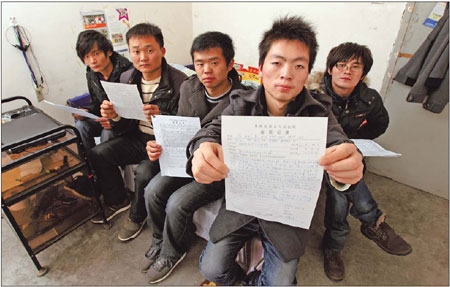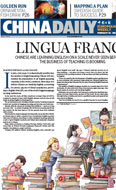Workers still seeking redress from Apple
Updated: 2011-02-25 11:07
By Qian Yanfeng, Duan Yan and Li Yao (China Daily European Weekly)
|
 Five men affected by exposure to the chemical n-hexane at an Apple supplier factory in Suzhou display hospital discharge papers they received after treatment. Gao Erqiang / China Daily
|
Victims in poisoning scandal fight to adjust
Agitated Chinese workers in a chemical poisoning scandal involving one of Apple Inc's supplier factories felt a sense of relief on Feb 22 when the US company started to take action to "remedy defects" in its supply chain.
Speaking on Feb 22, the victims said Apple Inc had sent a representative to listen to the demands of the Chinese workers who were poisoned at United Win Technology, a factory in Suzhou, Jiangsu province. The operation is owned by the Taiwan-based Wintek Corp, which produces iPhone components for Apple.
"A man surnamed Wu, who claimed he is an Apple employee, came to us this afternoon and asked about our health conditions, as well as our demands," says Hu Jie, one of the 37 victims who kept working at the factory after the poisoning scandal.
"We're glad that Apple is starting to hear our voices. But we are concerned over whether the company will meet our needs, since the representative didn't set a date to give us a reply."
Huang Yu'na, a corporate communications manager at Apple China, declines to confirm that the visit had taken place. Huang says the company has no comment to make about the situation beyond those that are included in its supplier responsibility 2011 progress report, which was released on Feb 15.
The company acknowledged for the first time in the report that 137 workers at Wintek's Suzhou factory had suffered muscular atrophy and damage to their nervous system following their exposure to n-hexane, a chemical found in the cleaning agents used in some manufacturing processes.
The chemical, which evaporates faster than alcohol, was used at the factory from August 2008 to July 2009 to speed up the production of touch screens for Apple products. The factory, which has 16,000 employees, has returned to using alcohol in its manufacturing.
In the wake of the scandal, Apple has been under public pressure to supervise its suppliers' practices and to exhibit corporate social responsibly by helping the affected workers.
"We have three things to ask Apple," Hu says. "One is to give us a formal apology. The second is to work with its supplier to have an independent third party hospital give us a follow-up medical examination and proper treatment. The third is fair compensation, since our future lives and careers may be affected by this poisoning."
Apple said in its report that a majority of the 137 workers harmed by n-hexane returned to their jobs at the same factory after the poisoning. But 100 of them had quit by Feb 21, following their receipt of compensation packages ranging in value from 80,000 yuan (8,870 euros) to 140,000 yuan.
They also signed exemption agreements, saying Apple would not be held responsible if their health worsened in the future. The remaining 37 workers have received disability benefits worth from 10,000 yuan to 30,000 yuan in their paychecks.
The cost of China being the world's factory is sometimes paid by workers or the environment, and this is just one of many such instances. But calls for factory owners and big international brands to be socially responsible - to build a greener and safer supply chain and to alleviate harm to workers and the environment - have never been louder, environmentalists say.
As public attention to misdeeds increases, they say, it will be more difficult for these major beneficiaries of "made in China" to dodge criticism.
E-paper

Online shops boom in China
Low investment, quick returns offer profit-making opportunities for struggling students.
Something 'fishy' about this trick
Banking on success
Branded outlets move in
Specials

The green lantern
Environmental concerns are shedding new light on a colorful tradition

Inland interchange
Chongqing bets on its position as a hub for China's west.

Zooming in on Chinese skies
Helicopter companies ride on country's growing interest in luxury aviation.
